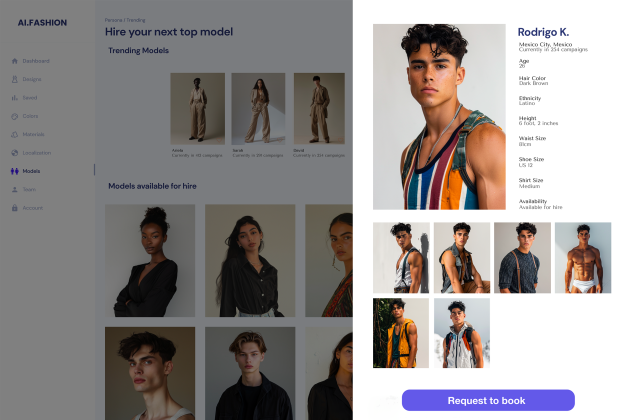AI Startup Licenses ‘Digital Likenesses’ On Demand

Brands will soon be able to use artificial intelligence to employ real-life models’ digital likenesses on demand.
AI.Fashion, a startup that uses AI to aid brands with fashion photography, said Wednesday it would be launching a new platform, which it calls Persona. The announcement comes on the heels of a $3.6 million seed raise, led by Neo.
More from Sourcing Journal
The Persona platform will allow models to create a profile on the Los Angeles-based startup’s portal, which will be visible to brands. If a brand has interest in hiring a model, it can contact them directly through the platform. Once the two parties negotiate rates, and both the brand and the model opt in to the collaboration, the brand can use the model’s digital likeness for what Daniel Citron, AI.Fashion’s CEO, calls a “digital photoshoot.”
That digital photoshoot allows the brand to dress the model’s digital likeness in the clothing it needs to create imagery for; from there, the brand can customize the output, Citron noted.
“In our platform you can directly access every aspect of the photo, every aspect of the creative process—from posing the models…[to] building out the worlds and the environments, to setting the lighting,” he explained.
Once the brand has completed its digital photoshoot, Citron said, it will be required to send the final versions of the AI-aided images to the model for their review and approval. That extra step could protect both models and brands, as pending legislation like New York’s Fashion Workers Act works to prevent companies from abusing models’ digital likenesses with AI without consent.
“As we try to enable what we hope will be a better future that really continues to keep models and creatives at the heart of the industry, we think the only way to do this—and the only way to create a real win-win-win situation for everybody—is to make sure that everybody is involved in the conversation,” he said, noting that the company will watermark all images until both parties have approved them.
Per Citron, the seed round helped get Persona off the ground, and the company already has plans to further its development with the cash influx.
“We’re starting with the large enterprise brands, but we want to continue to build out the tool so that it’s not only a great benefit to large enterprises, but starts to become available to all…fashion brands, no matter their size,” Citron told Sourcing Journal. “As we continue to build out the Persona platform, we want to make this a tool that’s not just available to a small set of models, [but one] that really empowers anyone from anywhere to become a model and work with some of the greatest brands out there.”
He noted AI.Fashion will use some of the funds to triple the size of its core AI team in 2024 and increase its headcount on its product and creative teams. The funding will also enable further updates to be made to the Persona feature. Adding new personnel, he said will help refine the technology, while simultaneously signing and onboarding new brands and clients.
While Citron did not disclose which brands or models Persona currently has on board, he noted that clients run the gamut.
“This is everything from traditional brands, as well as fast fashion, and both U.S. and European [companies],” he said.
Those clients can use the software to create product imagery, editorial content and more, Citron said. So far in tests with brands, studio photography for run-of-the-mill product imagery has been most popular.
Though Citron and team designed Persona in a way that could ensure human models won’t be replaced by AI-generated avatars, creatives throughout industries have begun to sweat over how AI could impact their jobs.
In 2023, SAG-AFTRA, which represents a considerable proportion of talent in the film and television industries, went on strike. Part of the reason for the strike proved to be AI’s potential impact on the industry; stars feared their likenesses would be manipulated without consent, while those behind the scenes worried about AI’s ability to replace their job.
Late last year, more than 100 photographers signed an open letter to the World Press Photo Foundation noting their worries over the WPP allowing photos created with generative AI in the open format category for its annual awards.
Citron said the photographers, creative directors and others affected by AI’s impact on the creative world have, thus far, given positive feedback to the team.
“We have a lot of photographers who have been using the platform to do virtual photoshoots—a process that, from what we’ve heard from them, has been very exciting and freeing and a whole new medium,” Citron said.
Debate continues over whether AI-generated works should qualify for copyright—and what level of human intervention would be required to secure a copyright for a work that had been, in part, generated by AI. To date, a U.S. court has ruled that works created autonomously by AI cannot be copyrighted, but government agencies have not formalized policies over copyright.
While some startups using AI for product imagery have claimed the resulting images can be copyrighted, AI.Fashion did not make clear whether the images brands secure from Persona will be copyrightable. Citron said the company has “several structures in place to ensure that all imagery is correctly licensed and approved.”
Solve the daily Crossword

